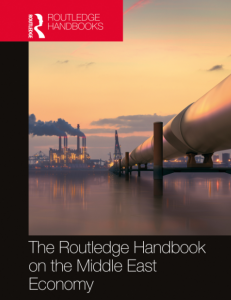
? Book: “Political Cleavages and Social Inequalities”

Book details
- [French Edition] Amory Gethin, Clara Martinez-Toledano, Thomas Piketty (eds), Clivages politiques et inégalités sociales, Seuil, 01 April 2021.
- [English Edition] Amory Gethin, Clara Martinez-Toledano, Thomas Piketty (eds) Political Cleavages and Social Inequalities, Harvard University Press, 16 November 2021.
The World Political Cleavages and Inequality Database (WPID)
>> Explore the data: //wpid.world/
 Routledge’s Handbook On The Middle East Economy
Routledge’s Handbook On The Middle East Economy
2022 World Inequality Report & World Inequality Conference
? Selection of working papers
- Global Income Inequality, 1820-2020: In this paper, Lucas Chancel and Thomas Piketty mobilize newly available historical series from the World Inequality Database to construct world income distribution estimates from 1820 to 2020. The authors find that the level of global income inequality has always been very large, reflecting the persistence of a highly hierarchical world economic system.
- Changing Political Cleavages in 21 Western Democracies: In this paper, Amory Gethin, Clara Martínez-Toledano and Thomas Piketty provide new evidence on the long-run evolution of political cleavages in 21 Western democracies by exploiting a new database on the vote by socioeconomic characteristic covering over 300 elections held between 1948 and 2020.
- The Concentration of Personal Wealth in Italy: In this paper, Paolo Acciari, Facundo Alvaredo and Salvatore Morelli expand the windows of observation on the distribution of personal wealth using a novel source on the full record of inheritance tax files. The data cover up to 63% of the deceased population and are available between 1995 and 2016, a period of substantial economic turbulence and structural reform for the Italian economy.
- Developing Countries in Times of Covid: Comparing Inequality Impacts And Policy Responses: In this brief, Tancrède Voituriez and Lucas Chancel explore the socioeconomic inequality impacts of the Covid-19 crisis, within and across countries, and the impacts of the policy responses designed to mitigate them. Recalling that pre-Covid economic and sanitary conditions where unfavorable to non-OECD countries, the brief emphasizes the role played by low-tech and prevention measures in these countries.
- China’s Pension System: In this paper, Li Yang reviews the latest development of China’s public pension system. Last several decades saw China’s tremendous achievement in various public pension reforms. Especially since the 11th Five-Year Plan (2006-2010), the reform has accelerated. By 2019, the public pension system in China has covered almost one billion adults, which makes it the biggest pension system in the world.
- Political Cleavages in Algeria, Iraq, and Turkey: In this paper, Lydia Assouad, Amory Gethin, Thomas Piketty and Juliet-Nil Uraz draw on political attitudes surveys to document the evolution of political cleavages in light of inequality dynamics in Algeria (2002-2018), Iraq (2005-2018), and Turkey (1991-2018). The authors investigate how social divides and ethno-religious conflicts shape voting behaviors in these three countries of the Middle East and North Africa (MENA) region.
Debates on equality
Next Debate
Upcoming sessions
- September 22nd, 2021: “L’Information est un bien public. Refonder la propriété des médias“, with Julia Cagé and Benoît Huet” (French)
- October 6th, 2021: “Tous des bons profs. Un choix de société“, with Asma Benhenda (French)
The full programme is available on our website.
Replays
The recordings of our debates are available on the WID.world Youtube channel.
? IN THE MEDIA
Selection of recent contributions:
English
- Le Monde: “The G7 legalizes the right to defraud“, by Thomas Piketty, 15/06/2021.
- The Guardian: “Biden corporate tax plan could earn EU and UK billions, study shows“, with Gabriel Zucman, 01/06/2021.
- The Economist: “Educated voters’ leftward shift is surprisingly old and international“, with Amory Gethin, Clara Martinez-Toledano and Thomas Piketty, 29/05/2021.
-
Washington Post: “Don’t wait for billionaires to sell their stock. Tax their riches now“, with Gabriel Zucman and Emmanuel Saez, 14/04/2021.
Other languages
- [AUDIO] France Inter: “Va-t-on vers une fiscalité minimum pour les multinationales, partout dans le monde ?“, with Thomas Piketty, 04/06/2021. (French)
- [AUDIO] France Inter: “Reprise et politique économique“, with Thomas Piketty, 21/05/2021. (French)
-
Vice: “La France est le pays qui compte le plus d’héritiers parmi ses milliardaires“, with Lucas Chancel, 21/05/2021. (French)
- La Tercera: “La visión de Thomas Piketty sobre el impuesto a las personas de alto patrimonio“, by Ignacio Flores and Thomas Piketty, 10/05/2021. (Spanish)
-
[VIDEO] BFM: “La librairie de l’éco: Clivages politiques et inégalités sociales“, with Amory Gethin, 07/05/2021. (French)
- [VIDEO] Arte: “Philanthropie: le monde sauvé par les riches ?“, with Lucas Chancel, 06/05/2021. (French)


